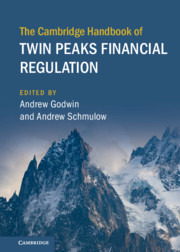Book contents
- The Cambridge Handbook of Twin Peaks Financial Regulation
- The Cambridge Handbook of Twin Peaks Financial Regulation
- Copyright page
- Contents
- Figures
- Tables
- Contributors
- Foreword
- Acknowledgements
- 1 Introduction
- Part I Surveying the Terrain
- Part II The Trek towards Twin Peaks
- Part III Different Topographies
- 10 Can the Twin Peaks Model of Financial Regulation Serve as a Model for Israel?
- 11 Towards a Twin Peak Regulatory Architecture for Hong Kong?
- 12 Regulatory Structure and the Revolving Door Phenomenon in South Korea
- 13 China
- 14 Financial Regulatory Structure in China
- 15 US Financial Regulatory Structure
- 16 A ‘Twin Peaks’ Vision for Europe
- 17 A Complex European Financial Architecture
- Part IV Seismic Activity and Fault Lines
12 - Regulatory Structure and the Revolving Door Phenomenon in South Korea
Evidence from the 2011 Savings Bank Crisis
from Part III - Different Topographies
Published online by Cambridge University Press: 24 June 2021
- The Cambridge Handbook of Twin Peaks Financial Regulation
- The Cambridge Handbook of Twin Peaks Financial Regulation
- Copyright page
- Contents
- Figures
- Tables
- Contributors
- Foreword
- Acknowledgements
- 1 Introduction
- Part I Surveying the Terrain
- Part II The Trek towards Twin Peaks
- Part III Different Topographies
- 10 Can the Twin Peaks Model of Financial Regulation Serve as a Model for Israel?
- 11 Towards a Twin Peak Regulatory Architecture for Hong Kong?
- 12 Regulatory Structure and the Revolving Door Phenomenon in South Korea
- 13 China
- 14 Financial Regulatory Structure in China
- 15 US Financial Regulatory Structure
- 16 A ‘Twin Peaks’ Vision for Europe
- 17 A Complex European Financial Architecture
- Part IV Seismic Activity and Fault Lines
Summary
For almost a decade, South Korea has failed in its quest to scale the ‘Twin Peaks’. Every presidential election cycle and congressional term has produced numerous proposals to reform the Korean financial regulatory architecture, along the lines of the Twin Peaks model. This chapter first outlines the 2011 savings bank crisis, and the subsequent botched architectural reforms, with a focus on the proposed Twin Peaks approach in Korea. It then examines the risks of the revolving door phenomenon in general, and specifically in the context of the 2011 savings bank crisis. A brief description and analysis of Korea’s anti-revolving door provisions, and revisions introduced in 2011, follows. Finally, the chapter analyses the implications of the revolving door phenomenon for the Twin Peaks regulatory architecture.
- Type
- Chapter
- Information
- The Cambridge Handbook of Twin Peaks Financial Regulation , pp. 215 - 235Publisher: Cambridge University PressPrint publication year: 2021



